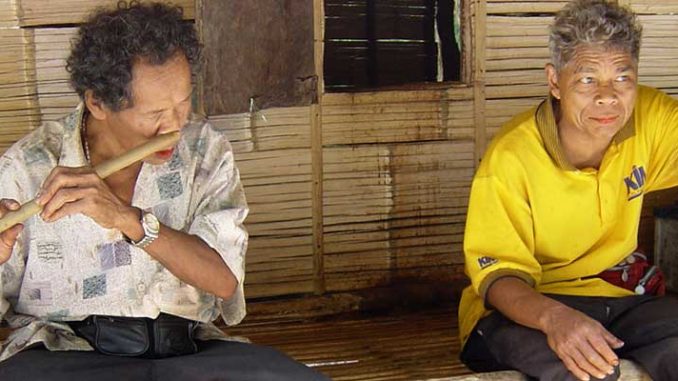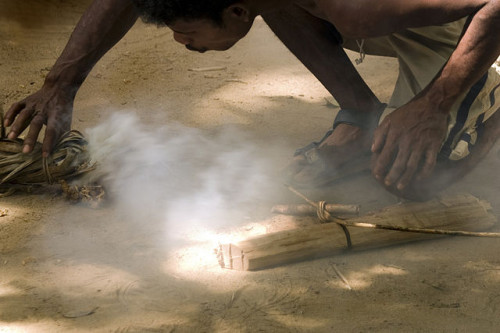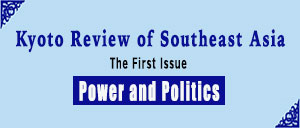
The Orang Asli are the minority indigenous peoples of Peninsular Malaysia. Numbering 120,000 and distributed unevenly among 19 different linguistic groups, they represent the most marginalized of Malaysian society today. But the Orang Asli were not always the underclass—during early modern Malayan history, some Orang Asli groups, especially in Melaka, Johor, and Negri Sembilan, were instrumental in helping to establish and maintain early Malay kingdoms. Other Orang Asli groups were actively involved in trade in forest products, such as rattan and resins, as they were the only ones with the knowledge and skills to extract these resources. Over time, however, for a variety of reasons, the Orang Asli became a subjected people, pushed to the furthest margins of society and in some cases, even sought after as slaves.
While inferior weaponry and small and scattered numbers may have contributed to the demise of Orang Asli superiority and power, it is not improbable that their decline was also a result of weak leadership, as their present situation appears to suggest.
Indigenous Leadership in the Past
Among the more settled and established Orang Asli communities, especially the Aboriginal Malay groups in the south, village leadership was structured collectively to ensure that the community’s interest prevailed. The norm was to delegate most decision-making pertaining to the adat (tradition and customs) and the security of the community to a council of (male) elders called the Lembaga Adat.
However, in most Orang Asli communities, there was traditionally no leadership structure of any sort. It was anathema to the subsistence egalitarianism that these communities practiced. These Orang Asli, while valuing their individual autonomy, never doubted the truthfulness of indigenous spirituality—their faith in it was manifested in unquestioning observance of the myriad of taboos and rules governing community living as well as in internalized values ensuring conformity, control, consensus, and co-existence. Needless to say, individual gain or self-interest was not a trait held in high regard.
However, the increasing involvement of the state in Orang Asli lives brought more formalized leadership structures to their communities. At times, the state has accepted traditional leadership systems such as the Lembaga Adat. But in cases where this proved detrimental to its motives, the state has accorded recognition to acquiescent individuals (such as the batin or village head) or, increasingly, to committees of younger members of the community (such as the Village Security and Development Committees, or JKKK).
Appropriation and the “Mainstream”
This pattern of state involvement can be explained simply—the appropriation and control of Orang Asli lands and resources is important for both economic and political reasons. Economically, because Orang Asli lands are no longer considered a “frontier” resource, they have become a much sought-after factor-of-production, especially if they can be obtained cheaply. Politically, the state is very sensitive to the perception of conceding any political control or hegemony to minority indigenous peoples, which would indeed be the perception if Orang Asli groups exercised even limited autonomy over their traditional homelands. It is therefore in the interest of the Malaysian state, and those who benefit from its largesse, to control the Orang Asli and their territories.
Towards this end, the state carefully nurtures the notion of a “mainstream”—invariably equated with “modern and civilized society”—to serve as a frame of reference for the Orang Asli. This is in keeping with the logic of the nation-state to grow on the social base of a single nationality. But an ideology of assimilating and integrating with the mainstream also allows the state to achieve its dual economic and political objectives of appropriation and control. Simply put, an integral part of modern civilization and development is the physical appropriation and environmental destruction of the geographical and ecological spaces that have provided the Orang Asli not only with their economic basis but with the form and content of their culture as well. Removing the Orang Asli from these lands, or degrading these lands, would destroy the fabric of Orang Asli societies in an unprecedented manner. The predictable conclusion of such development would be the de-culturalization and marginalization of the peoples affected. And the state is aware of this.
Rather than use outright force or political might, the state finds it both prudent and expedient to incorporate individuals who can give legitimacy to its motives and actions. The key weapon at its disposal is its ability to ascribe, or withdraw, political representivity to indigenous individuals. For example, when the state disagrees with the demands of an Orang Asli representative organization, it can deny political representivity to that organization and assign it instead to another organization, or even to an individual, regardless of whether the latter has representational status with the community.
This was clearly evident when a commercial developer wanted the traditional lands of the Temuans at Bukit Lanjan, just outside Kuala Lumpur. Facing opposition to the project from within the community, the state hastily revived the long-defunct Lembaga Adat and arranged for certain individuals to sit on the council. Approval for the development was soon forthcoming. In another case, the traditional land of Kampung Gerachi in northern Selangor was required for the construction of a dam. Here, the state dispensed with traditional leadership structures and simply accepted the endorsement of the acquiescent batin to the alienation of the community’s land.

Breakdown of Indigenous Systems and Emergence of Individualism
Somewhere along the way, indigenous knowledge and indigenous systems were sidelined and in the process traditional elders—the Orang Asli “intellectuals” or “leaders”—were silenced or compromised as well. In their place came indigenous individuals, with or without organizational backing, who claimed, or were accorded by the state, the status and function of representing their people. Many factors were responsible, not least the onslaught of a different culture through integration and assimilation, and the dispossession from lands that were the very source of indigenous culture and identity. As this happened, the economic motive and individualism, both present but never allowed by the strength of the belief system to be expressed or manifested in traditional society, now came to the fore. The state was quick to recognize this change and in fact encouraged leadership positions among the Orang Asli to be avenues for material gain, thereby effortlessly adding any number of willing allies in its program to control Orang Asli people and resources.
That the adat has taken a backseat in indigenous society, especially for the leadership, can be seen in the willingness of Orang Asli leaders to accept non-Orang Asli individuals—many of them high profile or influential personalities—to be organizational patrons or advisors. Orang Asli demands as articulated by these leaders tend to center on marshalling economic benefits or preferential quotas for themselves and their organizations. In contrast, threats to Orang Asli identity, such as that seen in the increased tempo of Islamizing and Christianizing efforts among them, do not warrant much concern. And civil suits against the government over land dispossession appear to be more about compensation than about protection of traditional territories and with it, the maintenance of Orang Asli traditions and identity.
I think this situation exists today largely because the traditional systems of the Orang Asli did not foresee a change in the status quo and therefore did not put in place mechanisms by which individuals or the community could address outside influences and forces. Two factors went into this outcome. First, Orang Asli traditional society was relatively static in its customs and ways of living; and second, individuals uncritically accepted what was passed down, not committing themselves emotionally to intellectual pursuit. Over time, for example, elders no longer knew why they did certain rituals or why therewere certain taboos.They followed customs because they were passed on by elders, or simply because it was the way things were done: it was the adat. Concerned mainly with the continuity of the existing order, traditional society seems to have afforded little scope for indigenous intellectual pursuit.
Paradoxically, social continuity is made more fragile by the fact that Orang Asli knowledge and spirituality are recorded only in the oral tradition, which like the indigenous language, is dependent on the continued practice of their culture and traditions. This makes the continued presence of the community in its particular ecological space imperative to its success as a unique people, just when that ecological space is most threatened.
The Need for (Genuine) Indigenous Intellectuals and Leaders
It has been said that a society without a functioning group of intellectuals is deprived of a certain level of consciousness and insight into vital problems. Such a group is needed to define the indigenous response to new values and paradigms that ultimately seek to eliminate unique traditional cultures. Thus, to lack intellectuals in the community is to lack leadership in determining goals and directions and in finding solutions.
It does appear that in Orang Asli society today, the community’s need for intellectuals is not being adequately met. It is not that there are no Orang Asli intellectuals; rather there are too few of them asserting their views. This leaves a vacuum in the articulation of Orang Asli issues and perspectives that allows the less intellectually talented and the more economically motivated to be pushed into, or to usurp, leadership roles. Not surprisingly, the tendency for this group to expand in number and influence is great. Hence, the growth of indigenous leadership and intellectualism, and of indigenous knowledge as well, loses ground. It is not for the outsider to correct the situation. Only when genuine Orang Asli intellectuals and leaders begin to check the slide can we expect the cultural and economic situation of the Orang Asli to improve.
Colin Nicholas
Colin Nicholas is the Coordinator of the Center for Orang Asli Concerns.

